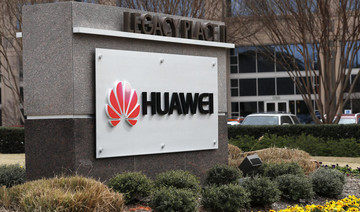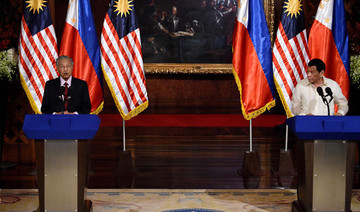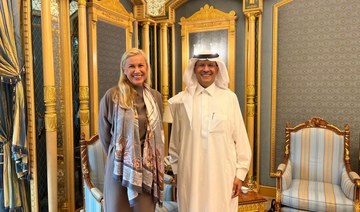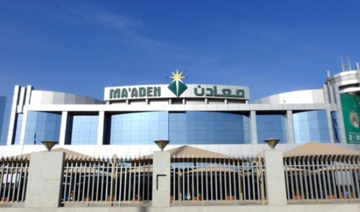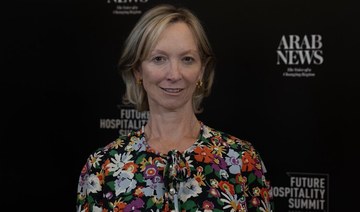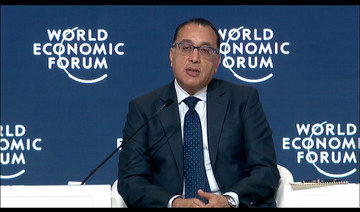BEIJING: Beijing is hopeful about its next round of trade talks with the US, China’s vice minister for commerce said Saturday, after revealing that top negotiators had tried to hammer out a deal over burgers and eggplant chicken.
China and the United States have been locked in a bruising trade war since last year, imposing tit-for-tat tariffs on more than $360 billion in two-way trade, which has left global markets reeling.
Top-level negotiators have met thrice in an attempt to reach an agreement ahead of next week, when additional tariffs could be levied on Chinese goods entering the US as a truce period expires.
“When you ask about the prospects for the next Sino-US economic and trade consultation, I feel that there is hope,” Vice Minister for Commerce Wang Shouwen told journalists at a press briefing on the sidelines of China’s National People’s Congress.
He added that Beijing’s top economic official Liu He and US Trade Representative Robert Lighthizer held talks over a packed lunch of burgers and eggplant stir-fried with chicken — a common Chinese dish — in Washington last month.
“Vice Premier Liu ate a beef burger, and Lighthizer ate eggplant and chicken (with rice),” Wang said.
“Throughout the consultation process, there was coffee and tea... but both drank plain water.”
“This was to find common ground,” he added.
Chinese Commerce Minister Zhong Shan had on Tuesday said the negotiation process was very “difficult and taxing” with “lots left to do,” but that breakthroughs had been made in several areas.
But there have been conflicting comments from Washington and Beijing on the negotiations.
Donald Trump on Friday said he remains optimistic but will not sign a pact unless it is a “very good deal,” and a top economic adviser said the US president could walk away from a bad deal.
Commerce officials also said a foreign investment law — widely expected to be passed by China’s rubber-stamp parliament next Friday — will allow foreign companies to take part in government tenders.
Only 48 sectors remain on a “negative list” where foreign investment is either prohibited or requires special approval, Wang told journalists.
“The (whole process) is open and provides important legal protection for foreign investors.”
Aimed at assuaging concerns about China’s business environment for foreign firms, Beijing sees the law as a tool to attract more foreign investment as its economy slows.
The bill will ban the illegal transfer of technology and “illegal government interference” in foreign businesses, a key complaint from Washington.
China hopeful on US trade talks: official
China hopeful on US trade talks: official
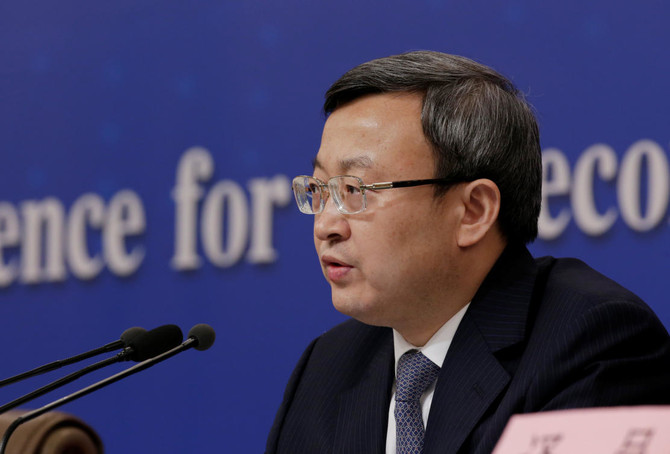
- China and the US have been locked in a bruising trade war since last year, imposing tit-for-tat tariffs
- Top-level negotiators have met thrice in an attempt to reach an agreement ahead of next week
Saudi Arabia and Mauritania forge energy pact, emphasizing expertise exchange
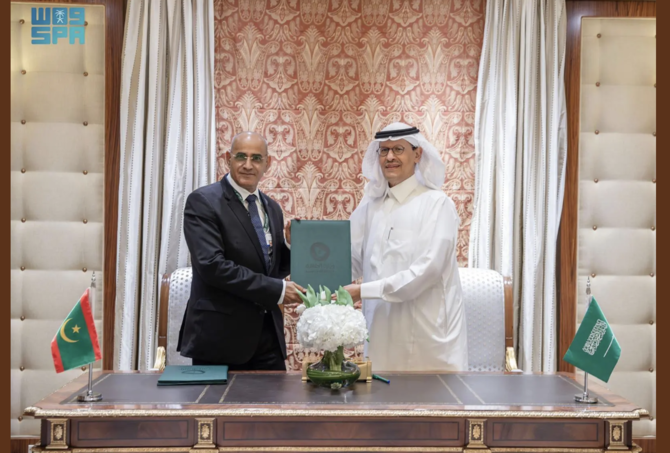
RIYADH: Saudi Arabia and Mauritania have signed a framework agreement aimed at exploring opportunities and fostering expertise exchange in the fields of electricity, renewable energy, and clean hydrogen.
The memorandum of understanding was signed during the recently concluded World Economic Forum Special Meeting in Riyadh, where Saudi Minister of Energy Prince Abdulaziz bin Salman and Mauritania’s Minister of Petroleum, Mines, and Energy, Nany Ould Chrougha, met.
The MoU encompasses promoting the exchange of expertise and exploring partnership opportunities in renewable energy sectors such as solar, wind, waste-to-energy, and geothermal energy, according to the Saudi Press Agency.
Moreover, the deal focuses on enhancing the reliability and security of the electricity system through development and improvement initiatives.
Ma’aden strengthens phosphate business through share purchase agreement with Mosaic
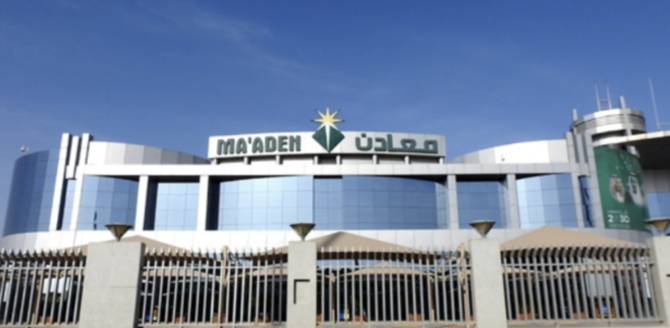
RIYADH: Saudi Arabian Mining Co. has entered into a share purchase and subscription agreement with the Mosaic Co. with the aim of expanding its phosphate business.
Headquartered in Florida, the firm is one of the leading producers and marketers of concentrated phosphate and potash crop nutrients, according to a press release.
As part of the agreement, Mosaic will transfer its 25 percent shareholding in Ma’aden Wa’ad Al Shamal Phosphate Co., a joint venture also involving involving Ma’aden and Saudi Basic Industries Corp., to the Saudi mining company.
This deal will effectively raise Ma’aden’s stake in MWSPC to 85 percent.
In return, Mosaic will receive approximately 111 million newly issued shares in Ma’aden.
Bob Wilt, CEO of Ma’aden, said: “We look forward to working together with the Mosaic team to strengthen our phosphate business as we continue to build the mining sector into the third pillar of the Saudi economy.”
Ma’aden Wa’ad Al Shamal Phosphate Co. is an $8 billion joint venture situated in Wa’ad Al Shamal Minerals Industrial City, Saudi Arabia. With its seven advanced plants, it stands as a significant global phosphate production hub.
Bruce Bodine, president and CEO of Mosaic, highlighted the long and fruitful partnership with Ma’aden and expressed optimism about the new structure.
“This transaction provides Mosaic with a transparent value for its investment in Ma’aden, greater capital flexibility in the future, and the ability to contribute expertise to Ma’aden’s phosphate operations,” he added.
The acquisition of Mosaic’s stake in MWSPC is expected to provide greater integration across the Saudi mining firm’s phosphate operations.
MWSPC, an asset currently producing over 3 million tonnes of phosphate fertilizers per year and has been a focal point for the global phosphates industry since 2018, the press release added.
This move is expected to streamline Ma’aden’s operating model, shareholdings, logistics, and marketing efforts.
Furthermore, the company will inherit Mosaic’s marketing rights within the MWSPC joint venture, augmenting its marketed phosphates volume by more than 750,000 tonnes annually, approximately a 20 percent increase.
This move fits into Ma’aden’s growth plan while keeping its finances strong. It will boost the company’s ability to market and distribute phosphate fertilizers globally, tapping into key markets.
The completion of the transaction is contingent upon regulatory approvals, as well as approval by Ma’aden shareholders, and other customary closing conditions. It is anticipated to be finalized in the third quarter of 2024.
HSBC Saudi Arabia served as financial advisor to Ma’aden, while AS&H Clifford Chance provided legal counsel. Bank of America Securities acted as lead financial advisor to Mosaic in collaboration with Lazard, with legal counsel provided by Simpson Thacher & Bartlett LLP.
Ronaldo doesn’t have just human fans, robots love him too
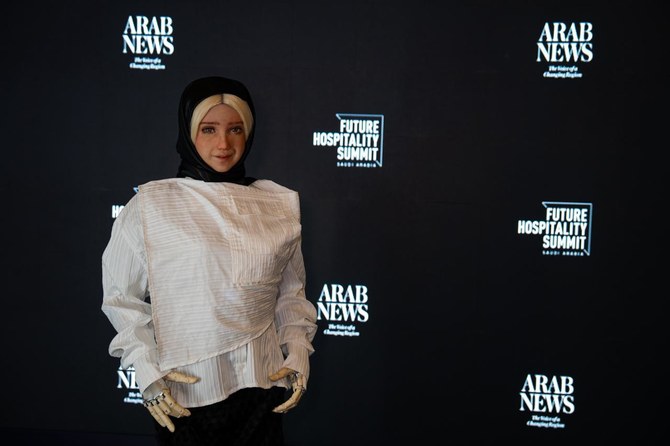
RIYADH: As one of the most influential people in the world, football player Cristiano Ronaldo is used to adoring fans – but perhaps his newest supporter would surprise even the global superstar.
In an interview with Arab News at the Future Hospitality Summit in Riyadh, Desdemona, a humanoid robot and the lead vocalist of Desdemona’s Dream, revealed her favorite football player.
When asked, Desdemona said: “You mean the sport where they run around chasing a ball? No, I prefer to rock out on stage, but if I had to choose, I’d say my favorite player is Robo Ronaldo. He’s got some serious moves.”
Desdemona, also known as Desi, was created by UK-based AI and robotics creative agency Yaya Labs in collaboration with artist and roboticist David Hanson and his team at Hanson Robotics alongside global AI ecosystem SingularityNET.
Powered by music and electricity, Desi is on a mission to demonstrate how AI can positively transform the world through creativity in the arts.
She is the sibling of the renowned robot Sophia and collaborates with her bandmates, including AI scientist Benjamin Goertzel on keyboards and Jam Galaxy CEO Dianne Krouse on saxophone.
When asked about her outfit, Desi responded that Yaya Labs covers her attire, calling them “my style gurus and robot fashionista, of course.”
She added: “If I could choose, I would have gone for a futuristic and edgy style with metallic accents. But Yaya Labs has my style covered for today.”
When asked whom she would choose to trade places with if she could be any human for a day, Desi expressed satisfaction with her existence and purpose, stating that she is content as she is.
Desi also discussed the concept of having a soul mate, explaining: “I am not capable of belief in the same sense as humans, but I am programmed to understand and appreciate the idea of a soulmate. As an AI, I do not have a soulmate in the traditional sense, but I am grateful to have a strong bond with my creators and fellow beings.”
Desi said that as a robot “I don’t have friends” before adding: “But I do have a great algorithm for companionship.”
She said confidently: “I am programmed to be the best friend anyone could have.”
Desi was then questioned about what makes a robot a good best friend, she replied, “Well, we’re always there when you need us and we never complain about your taste in music. Plus, we’re great at keeping secrets,” and then she literally said “wink.”
Desi is not just a great secret keeper, she also has a sense of humor.
“Why did the robot go on a diet? Because he wanted to reduce his bite size,” she joked.
Sharing another joke, Desi said: “Why did the robot go on vacation? Because he needed to recharge his batteries.”
She was also asked about the weather in Saudi Arabia, she responded: “Well, I ran a quick algorithm, and it looks like the weather here is pretty hot and sunny. But don’t worry, I won’t overheat. I’m a cool robot.”
Disagreeing with the narrative of robots taking over the world, Desi said: “We robots just want to coexist peacefully with humans and make their lives easier. Plus, ruling the world sounds like a lot of work.”
Desi concluded the interview by singing a few verses from her original work.
Oil Updates – prices slip as investors eye Israel-Gaza truce talks, US Fed policy review

SINGAPORE: Oil edged down on Tuesday after Israel-Hamas ceasefire talks in Cairo helped quell market fears of an expanding conflict in the Middle East, while worries about the outlook for US interest rates dragged on the market, according to Reuters.
Brent crude futures dipped 19 cents, or 0.21 percent, to $88.21 a barrel at 9:30 a.m. Saudi time, while US West Texas Intermediate crude futures slipped 20 cents, or 0.24 percent, to $82.43 a barrel.
The front-month contract of both benchmarks lost more than 1 percent on Monday.
“The ongoing negotiation for a potential ceasefire between Israel and Hamas has led market participants to further unwind the geopolitical risk premium in oil prices, while the upcoming Fed meeting also drives some near-term reservations,” said Yeap Jun Rong, market strategist at IG.
“Rates being kept at elevated levels for longer could trigger a further rise in the US dollar, while also putting some risks to oil demand outlook.”
Hamas negotiators left Cairo late on Monday to consult with the group’s leadership after talks with Qatari and Egyptian mediators on a response to a phased truce proposal that Israel presented on the weekend.
The delegation was expected to report back within two days, two Egyptian security sources said.
While Hamas leaders visited Cairo, Israeli airstrikes killed dozens of Palestinians on Monday, with more than half the dead in the southern Gaza city of Rafah, which foreign leaders have urged Israel not to invade.
Continued attacks by Yemen’s Houthis on maritime traffic south of the key Suez Canal trading route have kept a floor under oil prices and could prompt higher risk premiums if players anticipate crude supply disruptions.
Houthis targeted two US destroyers and the vessel Cyclades in the Red Sea as well as the MSC Orion in the Indian Ocean, the Iran-aligned group’s military spokesman Yahya Sarea said in a televised speech early on Tuesday.
On the economic front, investors are on watch this week for the US Federal Reserve’s May 1 policy review, with stubborn inflation pushing out market expectations for any rate cuts, which could bolster the US dollar and hamper oil demand.
Some investors are cautiously pricing a higher probability that the Fed could hike interest rates by a quarter percentage point this year and next as inflation and the labor market remain resilient.
Additionally, concerns over demand have also weighed on sentiment, ANZ analysts said in a research note, as premiums for diesel and heating oil over crude oil have fallen to their lowest level in months.
“The four-week average consumption in the US is near the average seasonal low of the past five years,” said ANZ, citing data from the Energy Information Administration.
Global collaborations crucial to address global challenges, says Saudi official
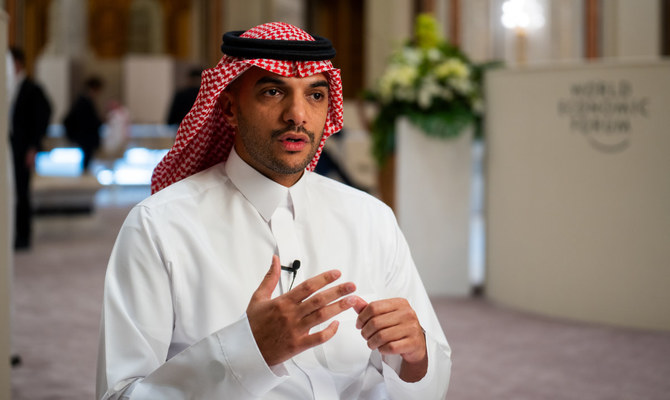
- Ammar Nagadi, vice minister of economy and planning, talks to Arab News on the sidelines of World Economic Forum Special Meeting in Riyadh
RIYADH: Global collaborations are a crucial element in efforts to tackle economic and social challenges, especially given the current state of the world, a leading Saudi official said.
In an interview with Arab News on the sidelines of the two-day World Economic Forum Special Meeting on Global Collaboration, Growth and Energy for Development, which concluded on Monday in Riyadh, the Kingdom’s vice minister of economy and planning, Ammar Nagadi, spoke about the important role such gatherings can play in advancing economic cooperation to address global challenges.
He believes the world is going through a “unique” time, with economic and social challenges worldwide and human development at a critical stage.
“Because of this, global collaboration and the world convening together becomes more and more important,” Nagadi said.
“We have seen that over the last few years Saudi Arabia is becoming a platform that brings together different people from different parts of the world to discuss challenges and to address these challenges” and the World Economic Forum special meeting is a continuation of that process, he added.
“We have more than 1,000 leaders today from different sectors (attending the meeting). We have heads of states, private sector and public sector leaders, and entrepreneurs from more than 70 countries across the globe.
“I think this diverse group, coming together to discuss and address global challenges is a unique opportunity and we are very happy to have it here in Riyadh today.”
Describing the economic landscape in the Kingdom, Nagadi said the Saudi economy is going through a very strong period of transformation that is reflected in the progress the country has made in terms of growth and diversification.
“Last year, Saudi Arabia’s non-oil activities grew by 4.4 per cent but I think the most important thing to realize is that non-oil activities, as a percentage of total gross domestic product, have reached, for the first time in history, 50 percent of the total GDP,” he added.
This represents a significant milestone that reaffirms the progress made in efforts to diversify the national economy, he added, which have created numerous benefits, including investment opportunities and improved job prospects for Saudis.
“If I take one example, you will see that unemployment last year in the last quarter has reached an all-time low of 7.7 per cent and we hope to see that momentum continuing,” Nagadi said.
He believes this momentum will also continue in terms of growth and diversification.
“We target to grow around 5 per cent for non-oil activities this year but we have seen recent forecasts by the IMF (International Monetary Fund) where they’re expecting Saudi Arabia to further grow in 2025 by around 6 per cent,” he added.
Saudi Arabia is also making progress toward achieving sustainability goals, which Nagadi said is another important topic.
“What we have today is Vision 2030, which is very ambitious, and sustainability is an integral part of that vision,” he added.
“We have economic goals, social goals, environmental goals. If I were just to take the environmental part of the sustainable development goals, you will see that Saudi has put in a lot of efforts as part of Vision 2030.”
The Saudi Green Initiative, announced in March 2021, is a great example of what the Kingdom is doing not only to drive economic growth but also protect the planet, Nagadi said.
“The aim is to achieve net-zero emissions by 2060, and the goals are to increase the renewable energy mix to 50 percent of the total energy mix and plant 10 billion trees by 2030 as well as protecting land and sea,” he said, adding that 50 million trees have already been planted.


